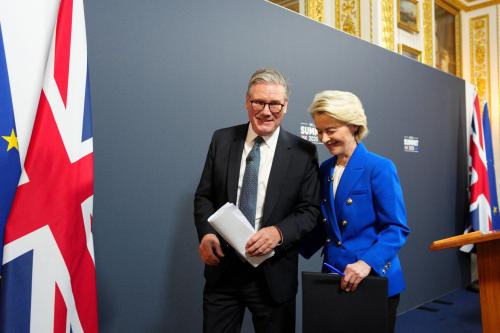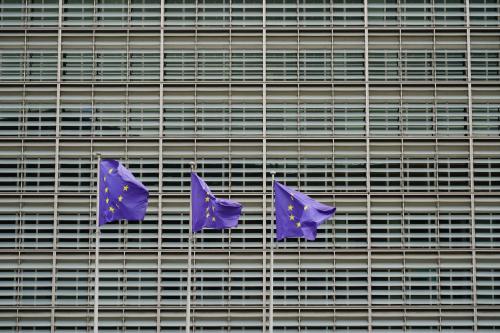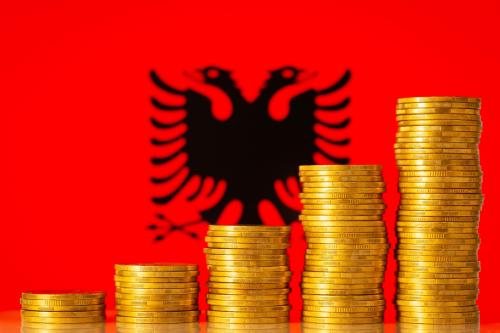Ukraine has suspended its preparations for signing the Association Agreement with the European Union in Vilnius later this month, throwing the prospects for increased trade and cooperation with the EU into doubt. Ukraine’s parliament failed to pass a bill to free jailed former prime minister Yulia Tymoshenko, which was a precondition of some EU countries for Ukraine’s entering into the agreement. Our scholars at the Center on the United States and Europe at Brookings have been closely following the issue and providing expert analysis.
In an event today, Senior Fellow Steven Pifer, former ambassador to Ukraine, moderated a discussion with other experts on the third Eastern Partnership Summit in Vilnius, taking place Nov. 28-29, with a focus also on issues beyond Ukraine and the Association Agreement, including Moldova and Georgia. Panelists included: Carl Bildt, Sweden’s minister of foreign affairs; Thomas Bagger, head of policy planning for the German Federal Foreign Office; Charles Grant, director of the Center for European Reform; and Ryszard Schnepf, Poland’s ambassador to the United States. Full audio of the event is now available.
In one exchange during the audience question and answer portion, Minister Bildt and Dmitry Cherkashin from the Russian Embassy went back and forth about what Ukrainians themselves have been saying about Russian pressure:
Cherkashin: I can just assure you that Russia does not exert any pressure on its neighbors … we feel, even in trade, lots of containment in some parts of the world where we cannot truly free trade.
Bildt: So you are saying that when the Ukrainians are saying that you’ve cut trade and when the Ukrainians are saying you that are forcing them to near bankruptcy, the Ukrainians are lying?
Charles Grant noted something Russian Foreign Minister Sergey Lavrov had said to him, at the recent Valdai Forum: “At Valdai I asked Mr. Lavrov if the bullying by Russia was not counterproductive because it was turning civil society in Ukraine and Moldova more hostile to Russia. Now interestingly Lavrov did not deny the bullying. He said, quote ‘People say that Russia is supposed to be a bear and bears are not known for their delicacy.’”
Bildt later said that, in terms of where Ukraine goes in terms of the European Union to the west and Russia to the east, “they are not going west, I don’t think they are going east, I feel they are going down. That’s roughly where we are because of the economic problems.”
Earlier in the week, Pifer and Hannah Thoburn wrote about the stakes for Ukrainian President Victor Yanukovych:
Mr. Yanukovych is clearly hesitant to let Ms. Tymoshenko go. If he does not, the European Union most likely will not sign the association agreement, putting a brake on Ukraine’s effort to deepen its links to Europe. That will leave Kyiv in a rather exposed and vulnerable position if Moscow decides to up the pressure it has applied to persuade Ukraine to join the Russia-Belarus-Kazakhstan Customs Union.
A failure to sign the association agreement could also prove damaging to Mr. Yanukovych’s political prospects at home, where he faces a presidential election in 2015. That’s because opinion polls in Ukraine consistently show broad and growing popular support for integrating with the European Union.
Get more research and commentary on Ukraine on our research topic page.
The Brookings Institution is committed to quality, independence, and impact.
We are supported by a diverse array of funders. In line with our values and policies, each Brookings publication represents the sole views of its author(s).




Commentary
Progress on the European Union’s Eastern Partnership Despite Ukraine’s Backsliding
November 22, 2013